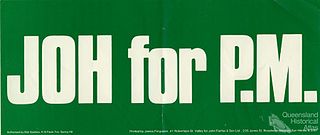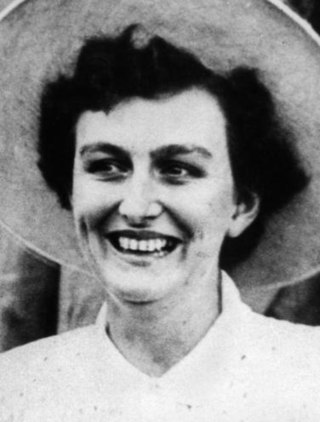Related Research Articles

Sir Johannes Bjelke-Petersen was an Australian politician. He was the longest-serving premier of Queensland, holding office from 1968 to 1987 as state leader of the National Party.

The Joh for Canberra campaign, initially known as the Joh for PM campaign, was an attempt by Queensland National Party premier Sir Joh Bjelke-Petersen to become Prime Minister of Australia. The campaign was announced in January 1987 and drew substantial support from Queensland businessmen and some conservative politicians. The campaign caused a split in the federal Coalition. It did not attract widespread support and collapsed in June 1987. The Australian Labor Party, led by Bob Hawke, went on to win the 1987 federal election with an increased majority, gaining its highest-ever number of seats. Bjelke-Petersen came under increasing scrutiny as the Fitzgerald Inquiry gained traction, and was forced out of politics altogether in December 1987.
The Commission of Inquiry into Possible Illegal Activities and Associated Police Misconduct into Queensland Police corruption was a judicial inquiry presided over by Tony Fitzgerald QC. The inquiry resulted in the resignation of Queensland's premier, Joh Bjelke-Petersen, the calling of two by-elections, and the jailing of three former ministers and the Police Commissioner Terry Lewis. It also contributed to the end of the National Party of Australia's 32-year run as the governing political party in Queensland.
The Bjelkemander was the term given to a system of malapportionment in the Australian state of Queensland in the 1970s and 1980s. Under the system, electorates were allocated to zones such as rural or metropolitan and electoral boundaries drawn so that rural electorates had about half as many voters each as metropolitan ones. The Country Party, a rural-based party led by Joh Bjelke-Petersen, was able to govern uninhibited during this period due to the 'Bjelkemander' and the absence of an upper house of Parliament.

Michael John Ahern was an Australian National Party politician who was Premier of Queensland from December 1987 to September 1989. After a long career in the government of Sir Joh Bjelke-Petersen, Ahern became his successor amid the controversy caused by the Fitzgerald Inquiry into official corruption. Ahern's consensus style and political moderation contrasted strongly with Bjelke-Petersen's leadership, but he could not escape the division and strife caused by his predecessor's downfall.

Florence Isabel Bjelke-Petersen was an Australian politician. She was a member of the Australian Senate from 1981 to 1993, and was the wife of the longest-serving Premier of Queensland, Sir Joh Bjelke-Petersen. She was styled as Lady Bjelke-Petersen upon her husband's knighthood, and was also known informally as Lady Flo.

Sir Walter "Wally" Benjamin Campbell, was an Australian judge, administrator and governor. He was the Chief Justice of the Supreme Court of Queensland, Chancellor of the University of Queensland and the 21st Governor of Queensland from 1985 to 1992.
Bjelke-Petersen is the name of an Australian family of Danish descent. The common ancestors of the Australian family are Georg Peter Bjelke-Petersen, a Danish farmer and master-builder, and his wife Caroline Vilhelmine. They came to Australia with their children in 1891. Born just Petersen, Georg hyphenated his name with the Danish word for wooden beam, some time in the 1860s.
The following lists events that happened during 1987 in Australia.

The 1987 Australian federal election was held in Australia on 11 July 1987, following the granting of a double dissolution on 5 June by the Governor-General Sir Ninian Stephen. Consequently, all 148 seats in the House of Representatives as well as all 76 seats in the Senate were up for election. The incumbent Australian Labor Party, led by Prime Minister Bob Hawke, defeated the opposition Liberal Party of Australia, led by John Howard and the National Party of Australia led by Ian Sinclair. This was the first, and to date only, time the Labor Party won a third consecutive election.

Elections were held in the Australian state of Queensland on 22 October 1983 to elect the 82 members of the state's Legislative Assembly.

The Bjelke-Petersen Dam is a dam in Moffatdale near Cherbourg in the South Burnett Region, Queensland, Australia. The dam impounds Barker Creek and creates Lake Barambah. It is named after the Queensland Premier Joh Bjelke-Petersen. It is operated by Sunwater.
A by-election was held in the Legislative Assembly of Queensland seat of South Coast on 28 August 1988. It was triggered by the resignation of sitting National Party member Russ Hinze.
Bjelke is a surname. Notable people with the surname include:
Gerald William Connolly is an Australian comedian, actor, impressionist and pianist. He is best known for his satirical caricatures of public figures such as former Queen of the United Kingdom Elizabeth II, King Charles III, Margaret Thatcher, Ronald Reagan, Joh Bjelke-Petersen, Neville Wran, Malcolm Fraser, Bob Hawke, Paul Keating, John Howard, Bill Collins and Dame Joan Sutherland, among many others.
Terrence Anthony White is an Australian pharmacist, businessman, and former politician. White achieved notoriety when, as Queensland state leader of the Liberal Party he terminated the longstanding coalition agreement between the Liberal Party and the National Party of Joh Bjelke-Petersen. In the ensuing election, the Liberals were badly defeated, and White was replaced as party leader. After leaving politics, he established TerryWhite Chemmart, a nationwide pharmacy franchise, and became a widely respected businessman.
Brian David Valentine Lindsay is an Australian politician. He was a Liberal Party member of the Legislative Assembly of Queensland from 1974 until 1977, representing the electorate of Everton.

Sir Leslie Charles Thiess CBE was a construction and mining industry entrepreneur, based in Queensland, Australia. He was one of the founders of Thiess Bros, which later became Thiess Pty Ltd.

The National Party of Australia – Queensland (NPA-Q), commonly known as the Queensland Nationals, National Party of Queensland or simply the Nationals, was the Queensland branch of the National Party of Australia (NPA) until 2008. Prior to 1974, it was known as the Country Party. The party was disestablished in 2008, when it merged with the Queensland division of the Liberal Party of Australia to form the Liberal National Party of Queensland (LNP).

The Bjelke-Petersen Ministry was a ministry of the Government of Queensland and was led by Premier Joh Bjelke-Petersen, who led the Country Party and its successor, the National Party. It succeeded the Chalk Ministry on 8 August 1968 as part of a series of events following the death of former Premier Jack Pizzey on 31 July. It was succeeded by the Ahern Ministry on 1 December 1987 following Bjelke-Petersen's resignation as Premier.
References
- ↑ Ed. Scott Murray, Australia on the Small Screen 1970-1995, Oxford Uni Press, 1996 p93